A number of domestic and international media outlets covered US President Barack Obama’s first visit to Vietnam from May 23-25. During his stay in Vietnam, President Barack Obama was impressed by the warm welcome and hospitability of the leaders and people of Vietnam.
During the visit, President Obama had talks with State President Tran Dai Quang; witnessed the signing of a number of important agreements between the two countries; paid a courtesy visit to Party General Secretary Nguyen Phu Trong, met with Prime Minister Nguyen Xuan Phuc and National Assembly Chairwoman Nguyen Thi Kim Ngan; visited late President Ho Chi Minh’s Stilt House; delivered a speech to 2,000 young people; had an exchange with young Vietnamese entrepreneurs; and spoke to 800 young leaders, who are members of the Young Southeast Asian Leaders Initiative.
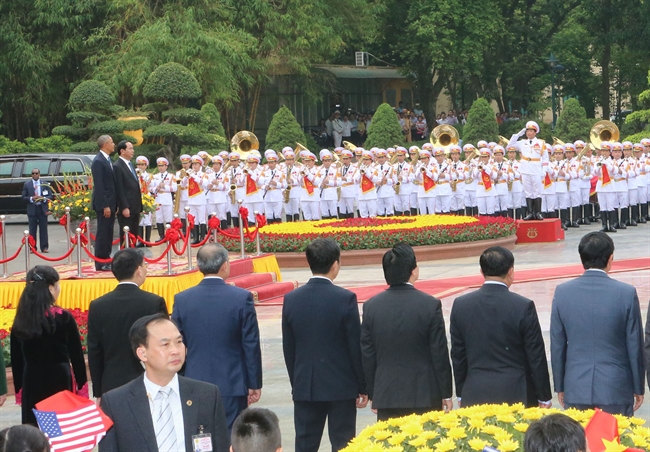 The welcoming ceremony for US President Barack Obama
The welcoming ceremony for US President Barack Obama
is solemnly held at the Presidential Palace. Photo: Trong Duc/VNA
State President Tran Dai Quang and US President Obama review the honor guard of the Vietnam People’s Army.
Photo: Trong Duc/VNA

State President Tran Dai Quang and US President Obama before their talks. Photo: Nhan Sang/VNA
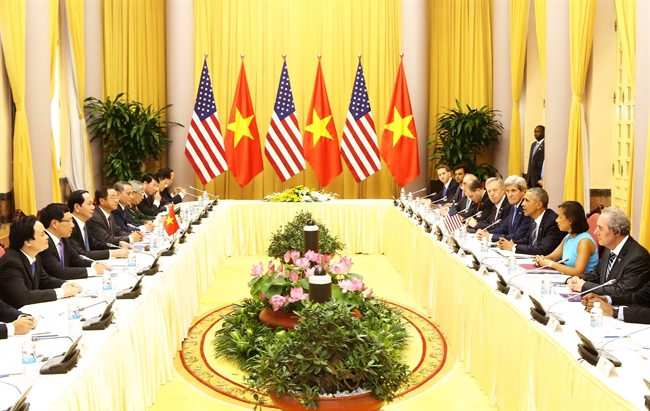
State President Tran Dai Quang holds talks with US President Obama. Photo: Nhan Sang/VNA
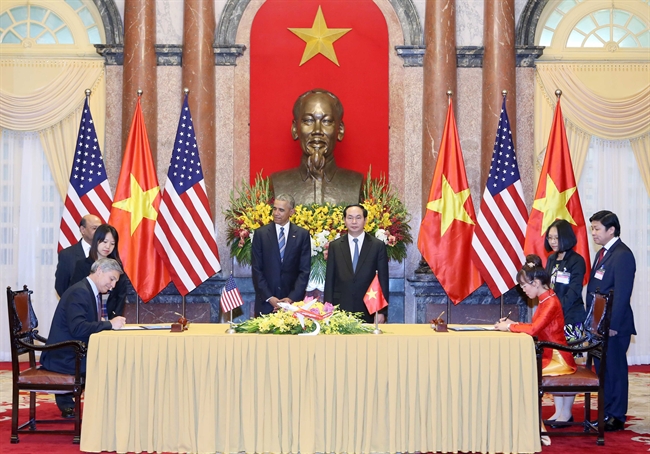
State President Tran Dai Quang and US President Obama witness the signing ceremony of an agreement
between the VietJet Aviation Joint Stock Company and the US’s Boeing Commercial Airplanes
on a deal worth 11.3 billion USD for 100 737 MAX 200 airplanes. Photo: Nhan Sang/VNA
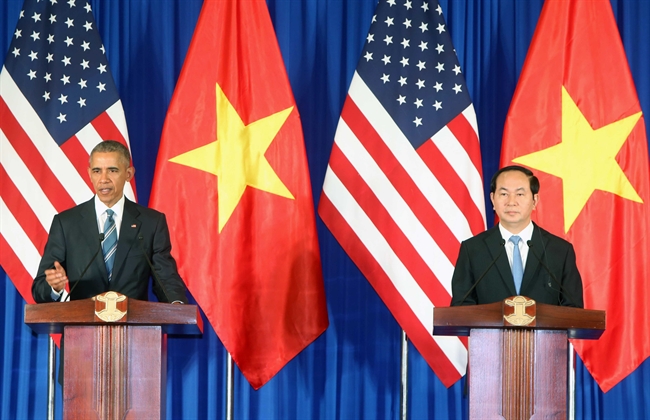
At the joint press conference, US President Obama announces the US fully lifts its embargo on sales of lethal weapons to Vietnam.
Photo: Nhan Sang/VNA
According to Deputy Foreign Minister Ha Kim Ngoc, the visit marked a milestone in the relationship between the two countries, showing a long progress in US leaders’ thinking about Vietnam. The US expressed its respect for the Vietnamese institution and the Vietnamese leaders. This was proven by President Obama meeting with four Vietnamese leaders andhis visit to Late President Ho Chi Minh’s Stilt House.
During their talks, the two sides agreed to strengthen the Vietnam-US Comprehensive Partnership in a pragmatic, effective and sustainable manner for the sake of the two nations as well as peace, stability, cooperation and development in the region and the world. The significant outcomes by meeting with President Obama are clearly showed in the Joint Statement issued by the two countries. They pledged to foster relations on politics-diplomacy; promote economic cooperation with the affirmation of the commitment on early implementing TPP; deepen the relations between the two countries’ peoples; promote cooperation on security-defense; promote and protect human rights in line with the constitution and international commitments of each country; settle regional and global challenges and deepen the long-term partnership.
Notably, the two sides reached somepractical cooperative agreements, including the establishment of the Vietnam Fulbright University and the signing of economic agreements worth 16.3 billion dollars in aviation and wind electricity. The US announced the full removal of the ban on the sale of lethal weapons to Vietnam, demonstrating the truly normalised relations between the two countries.
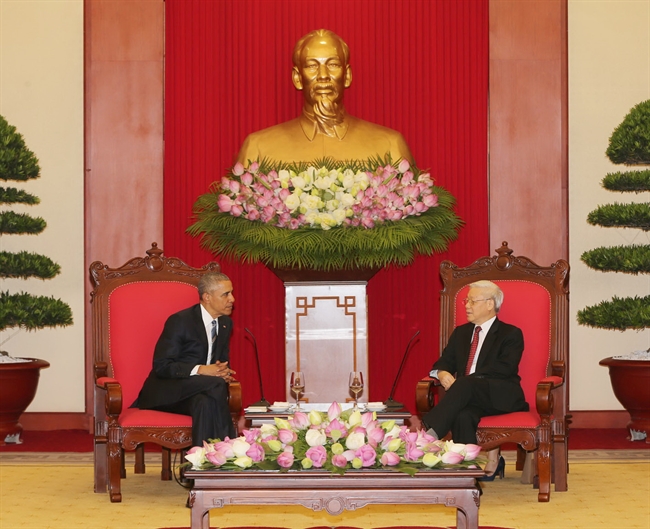
Party General Secretary Nguyen Phu Trong receives US President Obama. Photo: Tri Dung/VNA
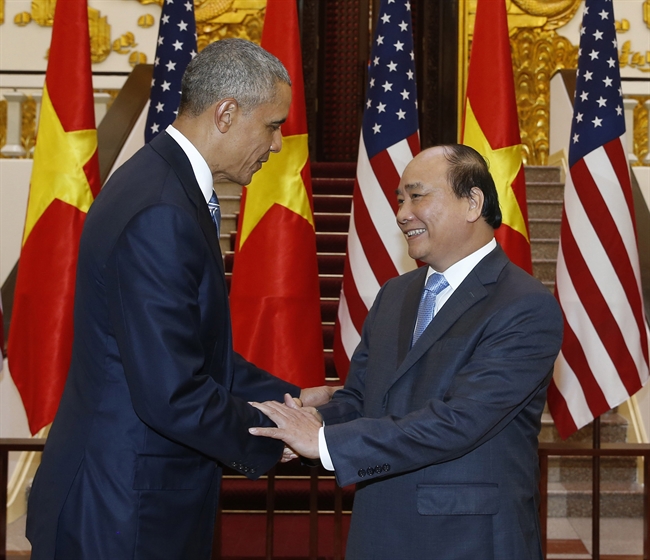
Prime Minister Nguyen Xuan Phuc meets with US President Obama. Photo: Thong Nhat/VNA
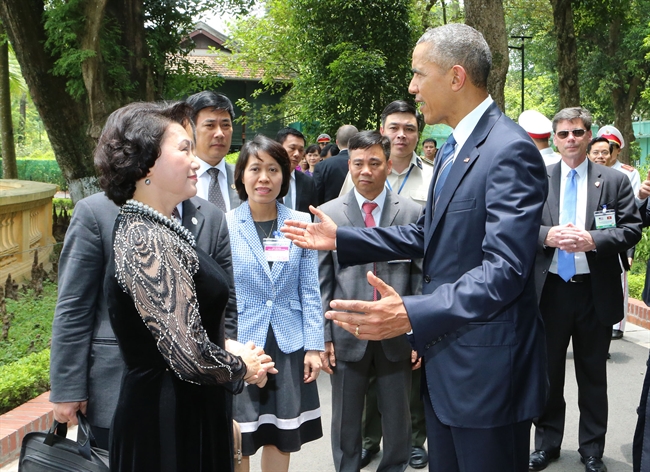
National Assembly Chairwoman Nguyen Thi Kim Ngan talks wtih President Obama. Photo: Trong Duc/VNA
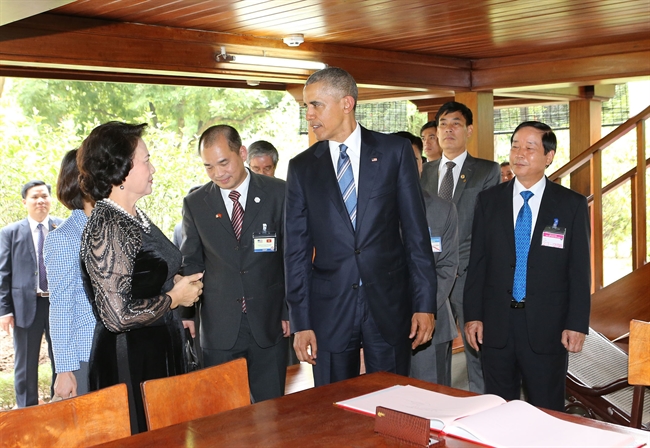
National Assembly Chairwoman Nguyen Thi Kim Ngan and President Obama visit the Ho Chi Minh Relic Site in Hanoi.
Photo: Trong Duc/VNA
With regards to the East Sea, the two sides expressed their special concern over recent happenings in the East Sea that have escalated tensions, eroded trust and threatened peace, security and stability. Therefore, the two sides reasserted the shared commitment to settle disputes through peaceful measures, including full respect for legal and diplomatic processes, without resorting to the threat or use of force in accordance with universally recognised principles of international law and the 1982 United Nations Convention of the Law of the Sea (UNCLOS).
The two sides emphasised the commitments of involved parties of not having actions to complicate and expand disputes, and admitted the importance of the strict implementation of the Declaration of Conduct of the Parties in the east Sea(DOC) and pushed for a Code of Conduct (COC).
The two sides stressed the need of ensuring maritime and aviation security and safety as well as maintaining legal commercial activities; called for non-militarisation and self-restraint inthe conduct of activities; reaffirmingthe shared commitment according to the Sunnylands Declaration and commitment on close coordination with ASEAN partners in the implementation of this declaration.
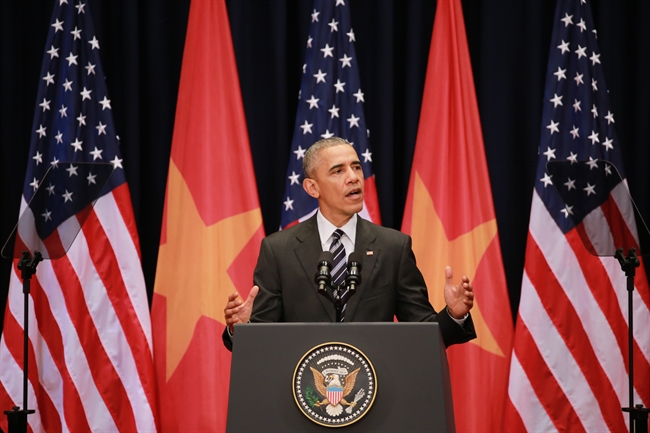
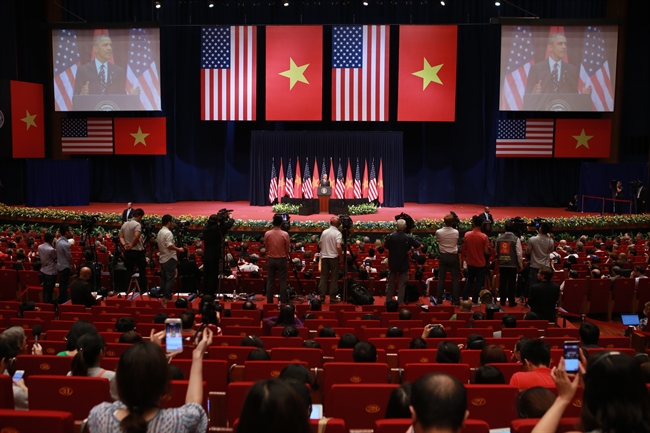
US President Obama delivers a speech to 2,000 young people at the National Convention Centre. Photo: Minh Son/VNA
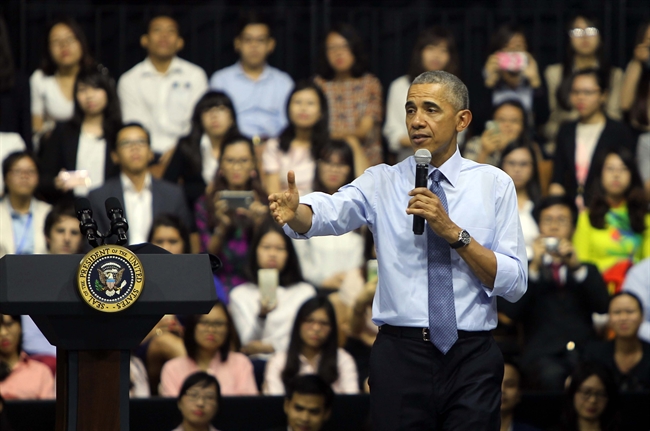
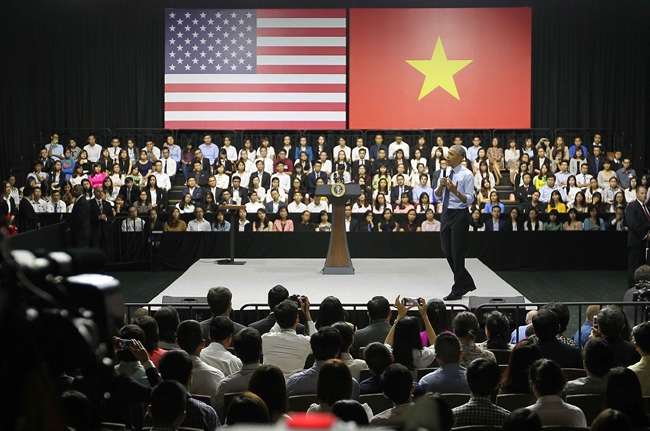
US President Obama spoke to 800 young leaders who are members of the Young Southeast Asian Leaders Initiative.
Photo: Thanh Vu/VNA
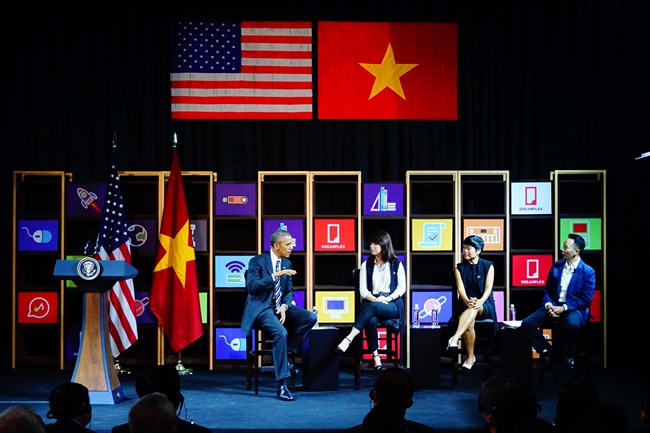
US President Obama has an exchange with young Vietnamese entrepreneurs in Ho Chi Minh City Photo: Van Dat/VNA
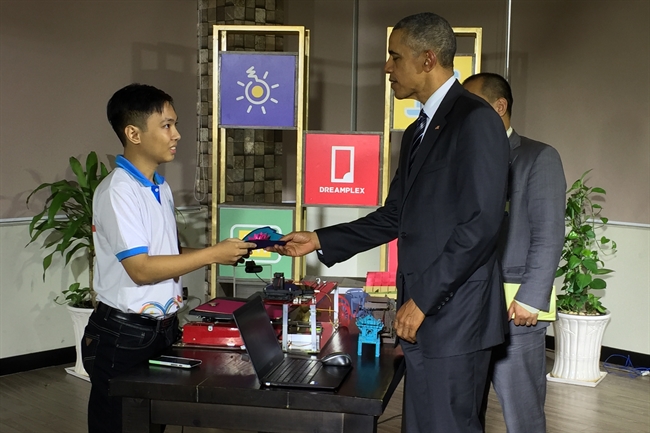
US President Obama talks with a young Vietnamese businessman. Photo: Van Dat/VNA
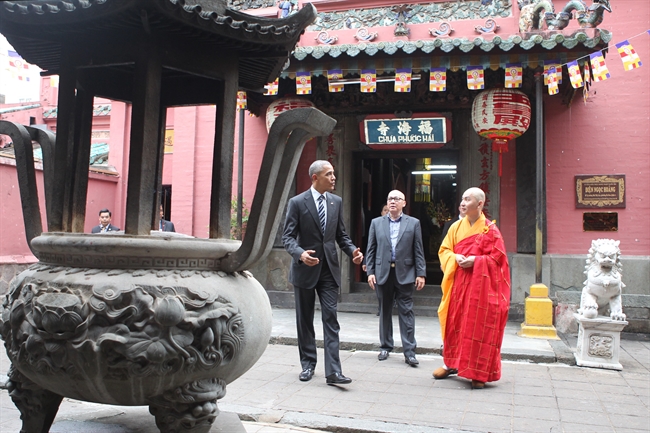
US President Obama visits Phuoc Hai Pagoda in District1, Ho Chi Minh City. Photo: Thanh Vu/VNA
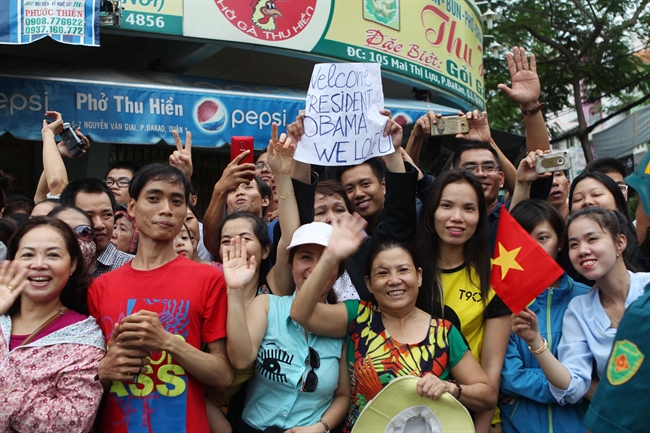
The locals in Ho Chi Minh City welcome US President Obama. Photo: Thanh Vu/VNA
Saying his farewells before leaving Vietnam at Tan Son Nhat International Airport, US President Obama put his hand on his heart and said that he was really moved and his heart has been touched by the sentiment of the Vietnamese people. Never before did he felt so close to Vietnam.
BY VNA/VNP